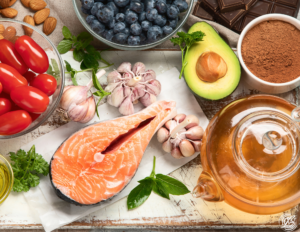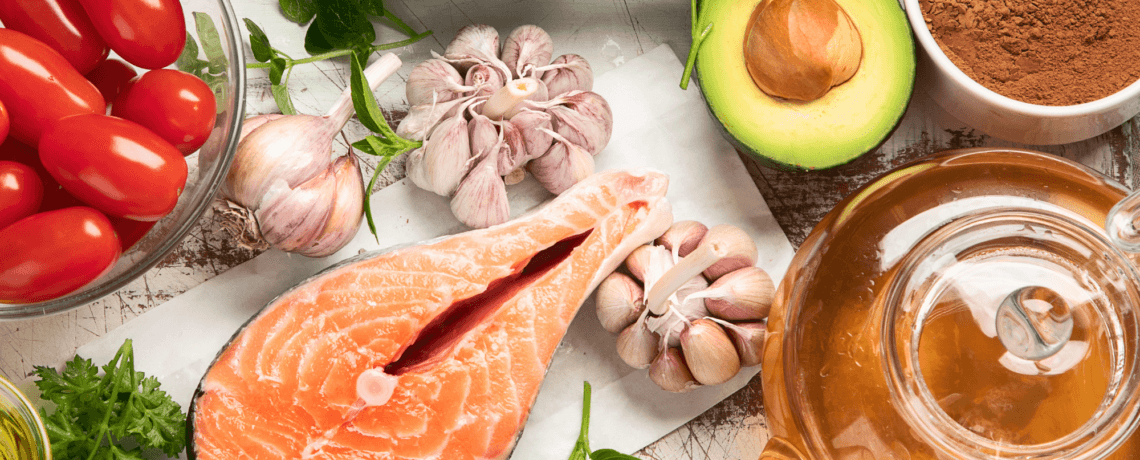
March is National Nutrition Month, a time dedicated to raising awareness about the power of food and its role in overall health. Nutrition is more than just fuel for our bodies—it’s a key player in disease prevention, longevity, and vitality. The foods we eat daily influence everything from energy levels to brain function, immune health, and inflammation.
Chronic inflammation is one of the biggest threats to long-term health, contributing to conditions like heart disease, diabetes, arthritis, and cognitive decline. But the good news? You have control over inflammation, and it starts with what’s on your plate.
Kelly Engelmann, a leader in Functional Medicine, emphasizes a food-first approach to longevity and well-being. By adopting an anti-inflammatory diet, you can support your body’s natural healing processes, reduce disease risk, and enhance your quality of life. In this blog, we’ll explore the best foods for longevity, the dangers of chronic inflammation, and practical steps to help you eat for a longer, healthier life.
Understanding Inflammation and Its Impact on Longevity
Inflammation is a natural immune response that helps the body heal from injury or infection. However, when inflammation becomes chronic, it leads to cell damage, premature aging, and an increased risk of disease. Studies show that chronic inflammation plays a role in:
- Heart disease – Inflammatory markers like CRP (C-reactive protein) are linked to cardiovascular issues.
- Diabetes – Inflammation contributes to insulin resistance and metabolic dysfunction.
- Cognitive decline – Conditions like Alzheimer’s are tied to chronic inflammation in the brain.
- Autoimmune disorders – Inflammatory responses attack the body’s own tissues, leading to conditions like rheumatoid arthritis and lupus.
One of the biggest drivers of chronic inflammation? Diet. Processed foods, sugar, refined grains, and unhealthy fats promote inflammation, while nutrient-dense, whole foods help keep it in check.
The Anti-Inflammatory Diet: Eating for Longevity
The anti-inflammatory diet focuses on whole, nutrient-rich foods that fight inflammation at the cellular level. Let’s break it down:
1. Load Up on Antioxidant-Rich Vegetables & Fruits
Colorful fruits and vegetables are packed with antioxidants, phytonutrients, and fiber that help reduce inflammation and combat oxidative stress. Some of the best choices include:
- Leafy greens – Kale, spinach, and Swiss chard provide vitamins A, C, and K to support immune health.
- Cruciferous vegetables – Broccoli, cauliflower, and Brussels sprouts contain sulforaphane, a powerful anti-inflammatory compound.
- Berries – Blueberries, raspberries, and blackberries are rich in polyphenols that fight oxidative damage.
- Avocados – A great source of healthy fats and vitamin E, known for reducing inflammation.
2. Prioritize Healthy Fats for Cellular Health
Healthy fats help regulate inflammation and promote brain and heart health. Incorporate:
- Wild-caught fatty fish – Salmon, sardines, and mackerel provide omega-3s that lower inflammation.
- Olive oil – Extra virgin olive oil contains oleocanthal, which has similar anti-inflammatory effects as ibuprofen.
- Nuts & seeds – Almonds, walnuts, flaxseeds, and chia seeds are excellent sources of omega-3s and antioxidants.
- Coconut oil – Contains medium-chain triglycerides (MCTs), which support energy and brain function.
3. Choose High-Quality Proteins
Protein is essential for muscle maintenance, immune function, and cellular repair. Opt for:
- Grass-fed beef – Higher in omega-3s and conjugated linoleic acid (CLA), which fights inflammation.
- Pasture-raised poultry – A lean source of protein without the inflammatory additives in conventional meat.
- Wild-caught fish – Rich in anti-inflammatory omega-3 fatty acids.
- Plant-based proteins – Lentils and beans (if tolerated) provide fiber and micronutrients.
4. Avoid Pro-Inflammatory Foods
Certain foods trigger inflammation, accelerating aging and increasing disease risk. Limit or eliminate:
- Processed sugars – Found in sodas, baked goods, and packaged foods, sugar spikes insulin and promotes inflammation.
- Refined grains – White bread, pasta, and processed cereals contribute to blood sugar imbalances and inflammation.
- Artificial additives – Preservatives, dyes, and artificial sweeteners disrupt gut health and promote inflammation.
- Industrial seed oils – Corn, soybean, and canola oil contain high levels of omega-6 fatty acids, which can fuel inflammation.
Key Lifestyle Habits to Enhance Longevity
Diet is foundational, but longevity is also influenced by lifestyle choices. Here’s how to optimize your health beyond the kitchen:
1. Prioritize Gut Health
Your gut is home to trillions of bacteria that influence inflammation and immunity. Support your microbiome with:
✔️ Fermented foods like sauerkraut and kimchi
✔️ Prebiotic-rich foods like garlic, onions, and asparagus
✔️ Probiotic supplements (if needed) to restore balance
2. Reduce Toxins & Support Detoxification
Toxins from food, water, and the environment can burden the liver and contribute to inflammation. Minimize exposure by:
✔️ Eating organic produce to avoid pesticides
✔️ Filtering water to remove heavy metals and chemicals
✔️ Avoiding plastics that contain endocrine disruptors
3. Manage Stress & Sleep Well
Chronic stress triggers cortisol, a hormone that fuels inflammation. Combat stress with:
✔️ Daily movement, such as walking or yoga
✔️ Breathwork and meditation to lower stress hormones
✔️ Prioritizing 7-9 hours of quality sleep each night
4. Move Your Body Daily
Exercise helps reduce inflammation, boost circulation, and improve longevity. Incorporate:
✔️ Strength training for muscle health
✔️ Low-impact activities like walking or swimming
✔️ Stretching and mobility work to prevent stiffness
Final Thoughts: Longevity is a Lifestyle
Living a long, vibrant life starts with the choices you make every day. An anti-inflammatory diet is one of the most powerful tools for reducing disease risk, increasing energy, and promoting longevity. By choosing whole, nutrient-dense foods and making lifestyle changes that support overall well-being, you can take control of your health and Live Life Well for years to come.




